#commoners hanfu
Explore tagged Tumblr posts
Note
Hi love ya blog! I’ve been wondering how effective were the coir rain jackets?
Hi! Thanks for loving my blog, and sorry for taking ages to reply! (image via)
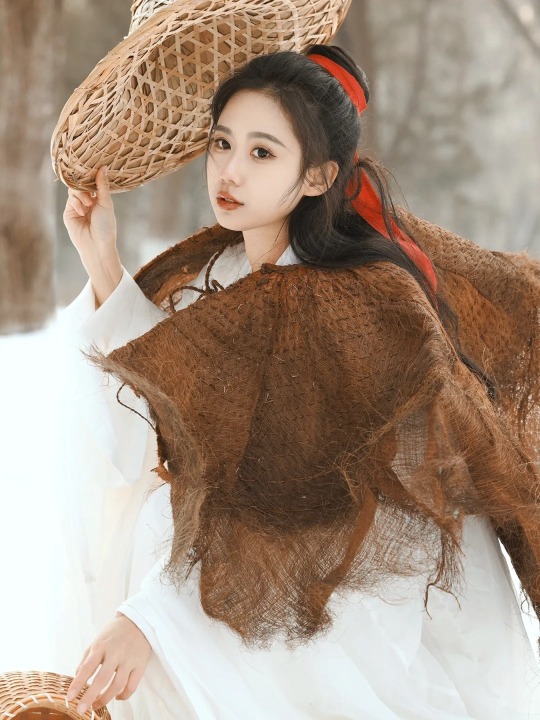
Chinese rain capes/raincoats are called 蓑衣/suoyi, and they are mainly made from local materials - in southern China, straw and coir grass are mostly used, as well as brown hair and brown leaves; in the north, thatch and cattail grass are mostly used. It takes about two to three days to make a suoyi by hand. They are typically worn with bamboo hats called 斗笠/douli.
Below - Ming dynasty illustration of a suoyi and douli (x):
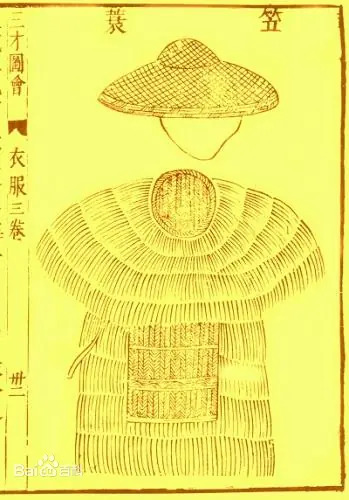
Suoyi has a long history, originating before the Qin dynasty (221–206 BC). Although I haven't worn one myself, sources state that they were very effective. Compared with umbrellas, suoyi was not only better at keeping out the rain, but also freed up the two hands to work. Farmers liked to wear it on rainy days, and fishermen often wore it when fishing during rainy and snowy days. During the Ming and Qing dynasties, people travelling during the rainy season usually brought along suoyi (source).
Below - 19th-century late Qing dynasty suoyi made of palm and straw fiber, plus bamboo douli and basket (1, 2):
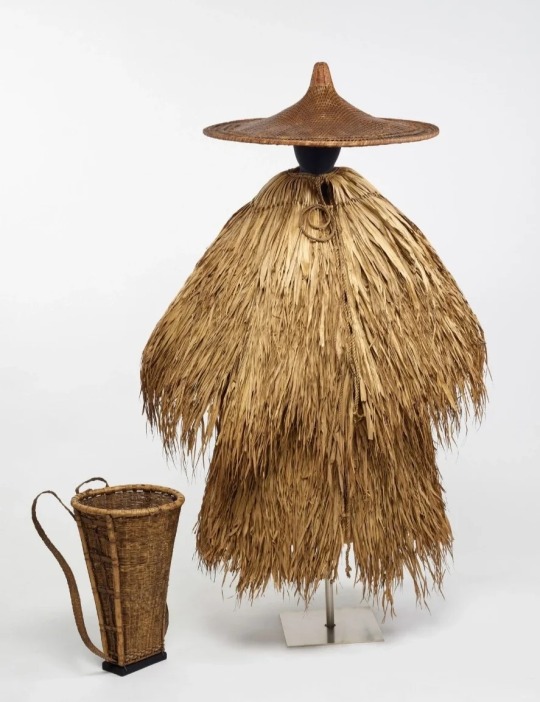
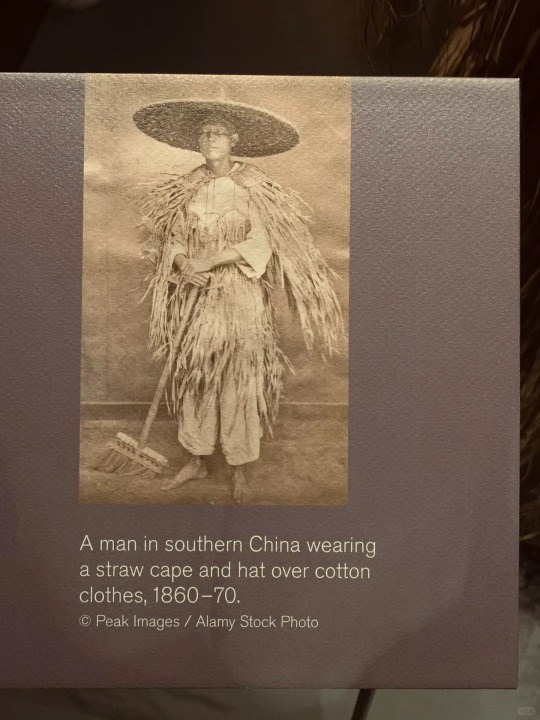
The tradition of working in the wind and rain wearing suoyi and douli continued until the late 1960s in China, after which they were gradually replaced with modern rain gear. Today, suoyi has become more of a tourist souvenir and decorative object than a practical item. Nevertheless, it can still be seen being worn by some elderly farmers and fisherman.
Below - a cormorant fisherman wearing suoyi and douli in Yangshuo, Guilin, Guangxi (x):
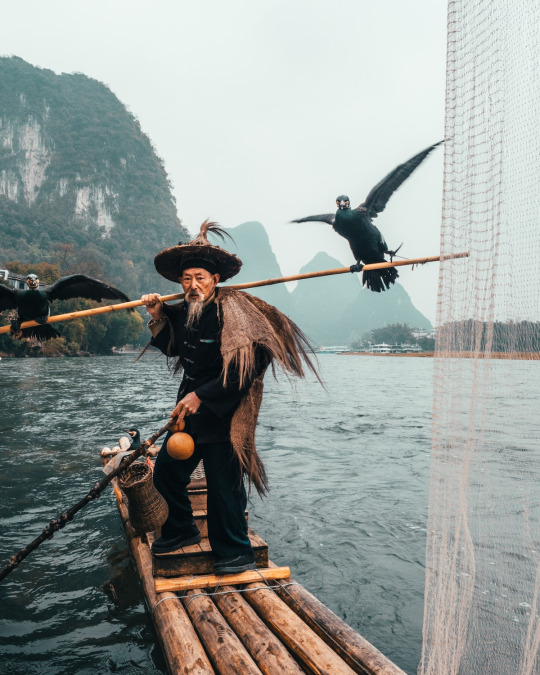
I highly recommend reading the following article for more information on suoyi's history, craftsmanship, and current status: Suoyi: RuCai Lyu’s rain cape and its ongoing tradition of protection.
For additional references, please see my suoyi tag.
If anyone has more info, please share! ^^
Hope this helps!
#hanfu#suoyi#rain cape#douli#commoners hanfu#hanfu accessories#crafts#art#artifact#history#>100#ask#reply#reference#chinese clothing#chinese fashion#chinese culture#china
215 notes
·
View notes
Text
NEAT
Song dynasty daily-wear hanfu
#hanfu#mens hanfu#commoners hanfu#song dynasty#runway#mens headwear#childrens hanfu#ku#weichang#douyin#tiktok#video#audio#addition
965 notes
·
View notes
Text

#ming dynasty#song dynasty#chinese history#chinese clothing#my post#support small business#chinese hanfu#hanfu#hanfu fashion#commoners clothes
25 notes
·
View notes
Text



「小姑娘,拿著這束蓮花四周尋找,還捧著它笑,妳在想誰呢?」 「不知道啊。我之前發燒了,燒得很厲害,很多事情都不記得了,只記得有個很好看的哥哥用內力救了我,之後就離開了。他好像與蓮花有些關聯。」 「。。。小花,世界上這麼多人掂記你,你總不能忍心拋下他們吧?」||全江湖白月光的名頭可不是白來的
"Young maiden, when you take these lotus flowers along your search, who do you reminiscence with a smile as you grasp them so gently?" "I don't know. Once, I had a terrible fever, so I don't remember much, just a very pretty young man who saved me with his internal power. He left after, but I remember he had some connection with lotus flowers." ".... Xiaohua, there are so many people in this world who remember you, so please don't leave them alone, okay? " || or, the title of white moonlight of the entire Jianghu isnt an empty title
#mysterious lotus casebook#li lianhua#li xiangyi#lian hua lou#Fanghua#Implied bc the person asking the girl can be interpreted as fdb#Fang Duobing#I just think it would be neat to show just how much of an impact llh had on the common people as well#So many people remember him and for good reason#hanfu photoshoot
5 notes
·
View notes
Note
Thank you so much for gathering this information, you are providing a valuable resource for hanfu enthusiasts! I love the sumptuous cuts and fabrics, but as someone often involved in physical labor, it isn't realistic for me. Are there any examples of clothing that might be worn by country folk who have to work in the fields and tend animals?
Hi! Thanks for the question, and sorry for taking ages to reply! (image via)
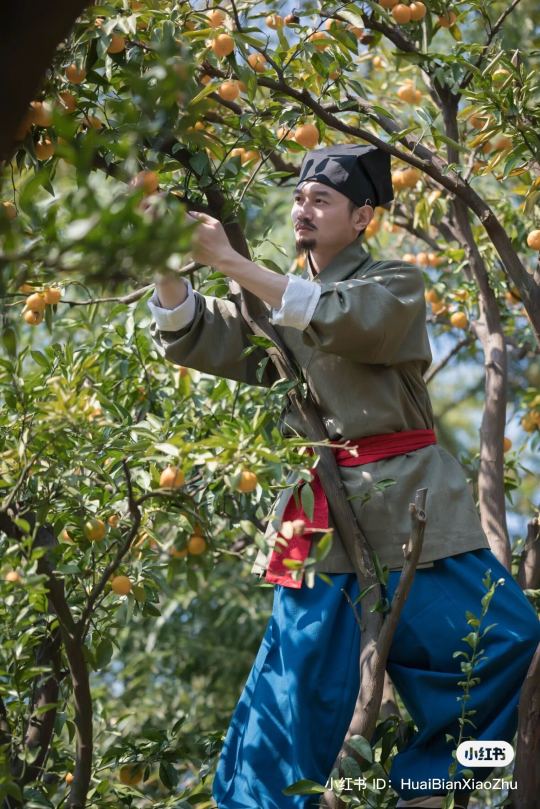
Yes, there is hanfu suitable for country folk who have to work in the fields and tend animals. Historically, such people would have worn a type of unisex hanfu called 裋褐/shuhe. Shuhe goes by a few other names, including 短打/duanda, 短褐/duanhe, and 竖褐/shuhe. They all refer to a two-piece set of attire composed of a cross-collar top that extends to the knees, coupled with tied trousers. Both pieces were typically made out of coarse cloth. It is the basis of almost all underclothing, usually the clothing worn under armor, and the casual outfit of commoners and laborers (x). This outfit was generally worn by people doing manual labor, such as farm work, and by martial artists (x).
I wrote about shuhe in my post on casual/adventurer-type hanfu here. For more information on shuhe, I recommend checking out the following links:
Wikipedia article on 衫裤/shanku
Patterns for shuhe-making
Shuhe-making tutorial
A few images of shuhe in historical art & modern day (1, 2, 3, 4):
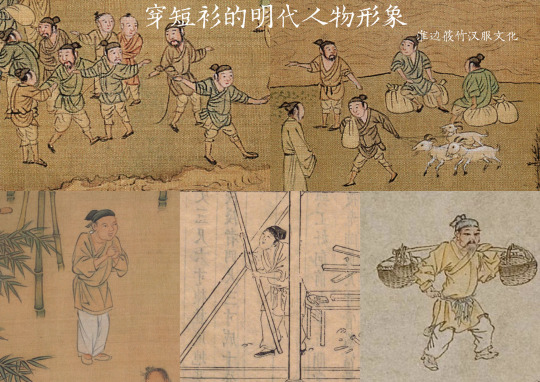
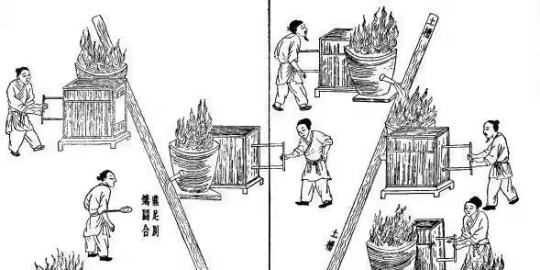
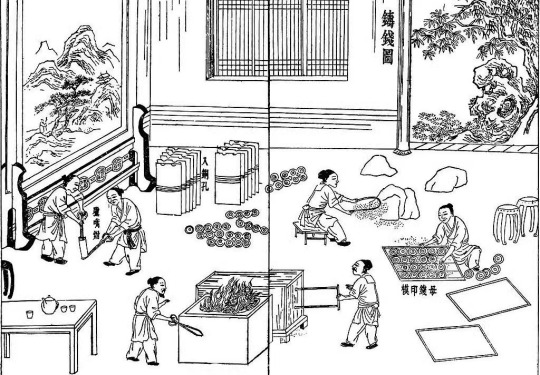

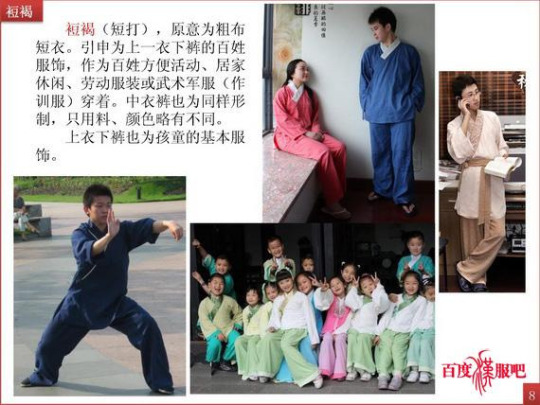
Shuhe understandably isn't as popular as other "fancier" hanfu styles, but there are still some available on Taobao, including the following:
Farmer-style shuhe for spring & autumn from 華夏节奏 (x):

2. Ming-style ramie shuhe from 淮边筱竹 (x):
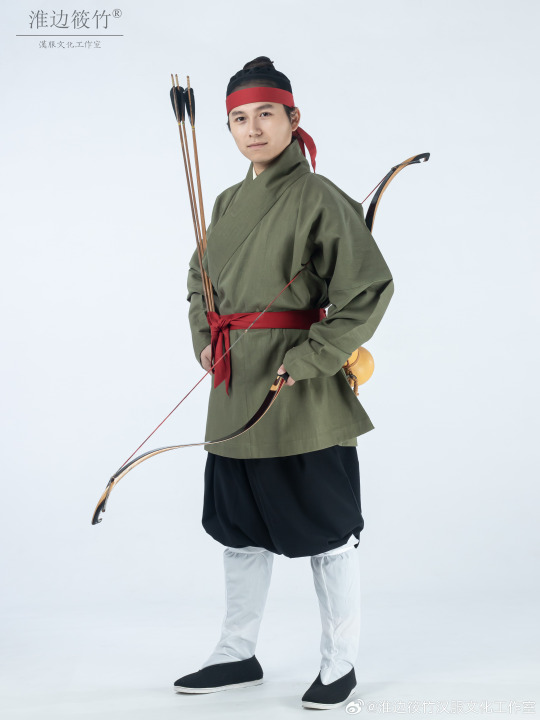
3. Tailor-made Ming-style shuhe from 淮边筱竹 (x):
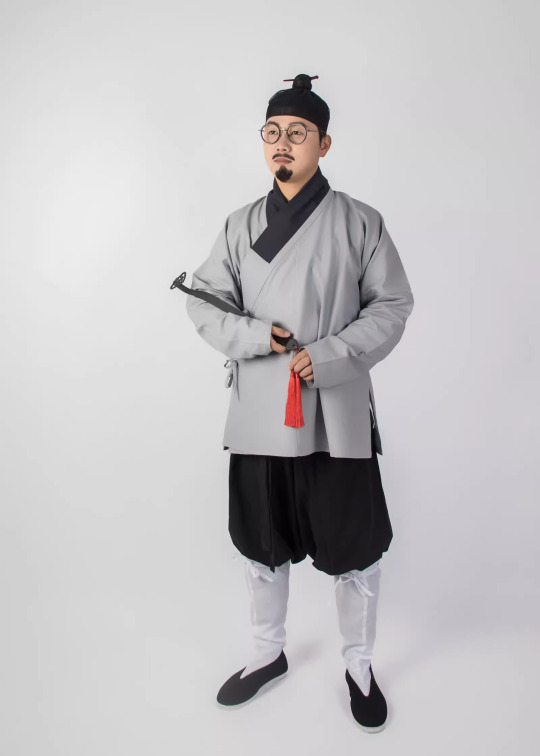
4. Ming-style quilted cotton winter shuhe from 淮边筱竹 (x):
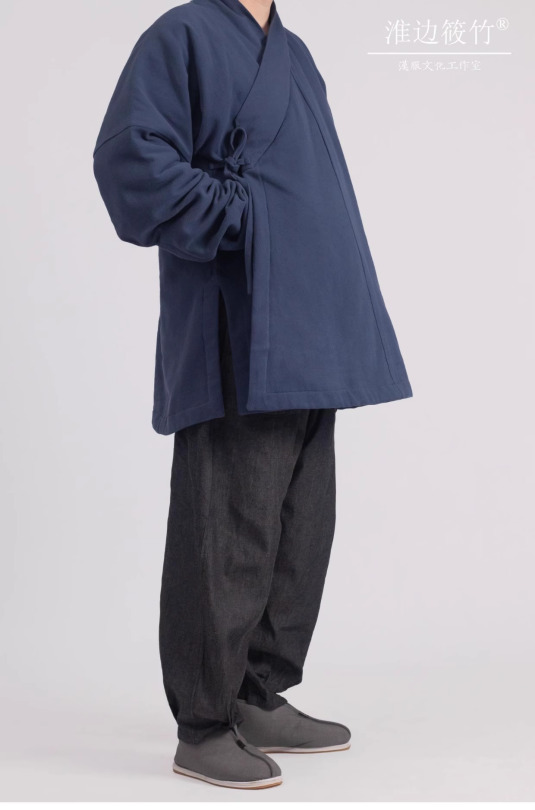
For more references, please see my shuhe and commoners hanfu tags.
If anyone has more info/recs, please share! ^^
Hope this helps!
#hanfu#shuhe#duanda#mens hanfu#commoners hanfu#hanfu recommendations#history#reference#ask#reply#lookadreygon#chinese fashion#chinese clothing#chinese culture#china
455 notes
·
View notes
Text
INTERESTING
chinese folk fashion in song dynasty
#hanfu#song dynasty#commoners hanfu#mens hanfu#mens headwear#childrens hanfu#runway#video#music#fashion
849 notes
·
View notes
Text
jinshi looks more handsome w his hair up sry
#actually change of course. it's fine if it's down however PLEASE get that scrap of fabric off his bun it annoys me#HSJDKFJKLSD YOU HAVE FANCY HAIR PINS. USE THEM.#using my vague knowledge of historical fashion via tv shows crosschecked w hanfu blogs. he dresses like a commoner with that cloth#which like. maybe he wants to be but he can't just be wearing that thing all the time#also i just wanna see him blinged out... fancy metal guan and everything .. embroidered robes.. all the drip...#i just saw a screenshot of that time when he's carrying mao.mao out of the ceremony where the pillar thing fell#and aaaaahhhhhhhh . . . hair up jinshi <3#knh logs#maybe i'm just too used to hair down cdrama boys via show osmosis its gotten boring
0 notes
Text
omg i finally found a shop that does the commoner style of hanfu





they even have great modernized pieces


I've been looking through their inventory and they have such good pieces, man i wish i can afford it
shop: nuwa hanfu
730 notes
·
View notes
Text
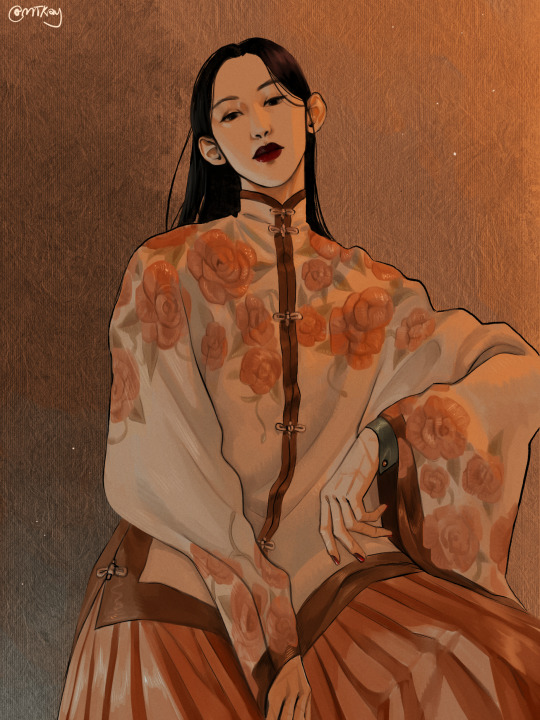
Wen Kexing!! My focus here was to channel his coolness even through warm colors, and to get his... "essential vibes" through one picture. More (rambling) below! (this is essentially a post about WKX's personality)
A big case can be made about "who or what is the 'true' Wen Kexing". So; let's be real, I don't know if anyone makes a "big case" out of it, but I sure have seen people seemingly arguing against a vague 'common opinion' regarding Wen Kexing's personality. The """common""" opinion (allegedly): the true Wen Kexing is [insert one of WKX's facets] (or something along those lines) The case against it: all Wen Kexing's are the true Wen Kexing Now I do agree with the fact that "all Wen Kexing's" are Wen Kexing, technically. For clarity, let's list and name those various facets (most are commonly accepted, some I'll just name on the go): - Wen Kexing: I'll use his full name for the personality we're first met with in the book. Someone cold, rather quiet, analytical and distant. Giving off strange vibes in social situations (ZZS thinking he's weird, other jianghu figures being creeped out by him or thinking that he's up to no good), contemptuous - Philantropist Wen: The more extravagant, (bullshit) storyteller, outrageous and shameless flirting enthusiast version of WKX. - Valley Master Wen: cold, calculating, quiet, cruel, unbelievably patient, dislikes fun and games, barely feels anything - Wife Wen: The over the top dramatic wife whose life is made difficult by his difficult and shameless husband, essentially a lot of roleplaying the good littol domestic wife and whatnot - The wooden man: similar as Valley Master but demure and apparently subservient? (for calculated purposes) Okay they could be more I guess, but the point is, we have an array of WKX personas and personalities and the actual consensus (I think, my sample is like 10 people so....) is that every one of those is "true" to WKX and that not one of them is a fully constructed persona. Now, while I agree, I guess that what I wonder is: what is WKX in his resting state? If nothing is happening and that he's not in a particularly social or specific situation, what do we get to see? I think that the answer mostly resides in extra 4, which is an INCREDIBLE retelling of TYK from WKX's perspective; someone who thinks quite a lot, and for long, someone who observes things with distance and little to no emotion. Someone who is used to having one goal (revenge, taking care of ZZS during his coma), and who will probably go through a lot of quiet thinking when finally faced with the void of not having one specific thing to aim for. Someone who will have to learn to find joy/happiness, and who probably doesn't... get there "naturally"? (and by that I mean, without ZZS or without directly following ZZS around). Someone whose ties to his own emotions have been severed a long time ago, I guess. Someone still quite contemptuous of many things and people and who has a whole life he didn't plan for or even consider ahead of him. Which is............ what I tried to draw............ here..................... (That and also I wanted to draw a pretty looking hanfu in sepia colors) (but I SWEAR that was not the main goal) (I think) (anyway please ignore me)
979 notes
·
View notes
Text
INTERESTING
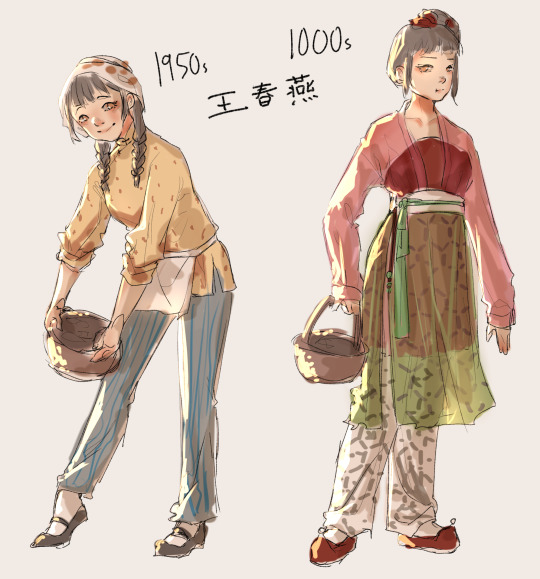
doodled yanyan in some peasants clothing from late republic/early communist era and song dynasty 🐦
reference for song dynasty peasant's hanfu here
267 notes
·
View notes
Text









愿以吾辈之青春,捍卫盛世之中华! “世界是你们的,也是我们的,但是归根结底是你们的。你们青年人朝气蓬勃,正在兴旺时期,好像早晨七八点钟的太阳。希望寄托在你们身上。” 同志们,国庆快乐! 汉洋折衷#汉洋折衷#汉服#汉洋折衷·社会主义#
令儀鸭 in a cross-collar short shan + short mamianqun + ku + weiyao weaved by her own grandma's mother ("直领大襟窄袖短衫+短马面+袴+阿婆的妈妈自己织染的老布围腰")
183 notes
·
View notes
Text
I'm seeing so much commentary on people reacting to the live action atla toning down Sokka's misogyny
and I'm over here like this is a total non-issue because in my own rewrite of the show I already did that exact thing, it makes complete sense to do it and they should do it because it's a weaker aspect of the original show
Sokka's early misogyny is utterly cartoonish in comparison to the set up of the rest of the SWT, it doesn't feel realistic for the only teenaged boy in a dying culture surrounded by adult women with a grandmother who left a more out and out misogynist society to act the way he does
how Sokka "resolves" his misogyny is equally cartoonish, I never liked how in The Warriors of Kyoshi literally episode 4 of the show makes a teen girl compromise her own culture with a female only fighting tradition teach a boy who is supremely rude and disrespectful to her and then still be attracted to him afterwards, it's more misogyny to fix misogyny and is very obviously men writing about how to fix misogyny especially as they have Aang make a joke about Sokka wearing a dress after going through how meaningful the fighting costume is and how a lot of Asian clothing with hanfu influences like atla borrows from would have men in what to western eyes would be dresses, Aang has already seen multiple male authority figures in robes, the joke makes no sense
I also wouldn't consider Sokka's misogyny genuinely resolved after this, consider how the show deals with his romantic relationships with both Yue and Suki and how both can be seen as extensions of how Kataang is treated in the show, rewards for the hero, especially with how Sokka interacts aggressively with Hahn instead of respecting Yue's wishes whatever her reasons for them, I think an argument can be made that Yue's death is a fridging for Sokka's storyline rather than or in combination with being a consequence of Aang's failure as an avatar or the culmination of her own storyline where she fulfills her duties as a leader to protect her own people
Beyond his romantic relationships, while Sokka drops a lot of his more misogynistic language with Katara, he doesn't support her when she faces off with the NWT leaders to learn waterbending, and he still leaves the caretaking and food preparation and grocery shopping to her which is more common than him going out to hunt or gather in order to provide for the group while he takes a leadership role like determining their travel schedule and routes, it is not an even division of labor and falls along traditional sex stereotypes
In addition to his typical duties to the group, Sokka also remains invested in the trappings of masculinity after ep4, he's concerned about what's manly and how he compares to Jet for example, there's no investigation or interrogation in his interest in meat and hunting and how they relate to masculinity and his misogyny, in the episode with Piando, his insecurity as a non-bender is resolved by giving him a new male mentor and a new martial skill, sword fighting, which is masculine in both western and Asian cultures rather than assuaging his self esteem issues in any less stereotypically masculine ways, I also think it was done so he could compare more favorably to Zuko, another male character, and even his interest in engineering and mechanics comes with a male mentor and is a traditionally masculine pursuit
the show's poor handling of misogyny also extends beyond Sokka, with the NWT, the show acts as if Pakku is the only reason the tribe is misogynistic and the only consequences to that misogyny is that women can't waterbend and there are arranged marriages, and that both the NWT and Pakku's misogyny is resolved by allowing only Katara to learn to waterbend which she doesn't even earn on her own merits, she gets the opportunity because Pakku likes her grandmother
none of this is realistic, misogyny is not because of one bad apple, Pakku doesn't make Yue's arranged marriage, Chief Arnook does, he picked Hahn for her, and the show acts as if Arnook has no authority to compel Pakku to teach Katara or any ability to persuade him in order to reduce his culpability in the NWT's misogyny as its leader to make him a more respectable character so it's not uncomfortable when Aang and Sokka follow his orders in the battle later on, but women not being able to bend and forced into arranged marriages is still status quo when the gaang leaves, Yue's just dead
I'm not even convinced the show runners understand what's wrong with arranged marriage, the issue is not Yue can't be with Sokka who she likes and at most has a slight crush on cuz she's only known him for like two days, it's that she's being treated as male property, a broodmare, and a vehicle to ensure Hahn receives the throne because her father has no male heir and picked some guy to succeed him instead, like it's not explicit in the show but that is the implication based on the historical reality of princesses in arranged marriages, and the show has her get out of it only through death idc that she ascends to being a spirit, it's still a teen girl that dies
There's also no discussion by the show of the Earth Kingdom's misogyny when it has the exact same shit going on, Toph is the only female earthbender in the show not including avatars, there might have been a female earthbender in the background when Katara broke them out of prison, but I'm not really counting that, the entire army and Dai Li are all made up of men, the EK might even be worse because the show doesn't demonstrate that women and girls even have the capacity to earthbend aside from Toph and avatars and Toph doesn't even learn from a human, she has to learn from animals, the show treats this as commentary on her disability but the show has no compelling reason why it can't also be commentary on her sex, Toph was also originally supposed to be a boy so this could have ended up so much worse there literally would have been no female earthbenders aside from avatars at all, I'm not counting Oma as she might just be a mythological figure not a real person that once lived
The Fire Nation kinda barely avoids the same issue, Azula is the only named female firebender aside from avatars in the show but she has two female sidekicks who despite being non-benders show martial skill and there are clearly female soldiers and guards in the FN military so there are much stronger implications of female firebenders existing and being completely allowed to train their abilities and that Azula isn't exceptional in that respect like Toph is, only for being a prodigy with blue fire
Azula was also originally supposed to have an arranged marriage in s3 and they dropped it in favor of showing that royal and noble girls could casually date in the FN which has wild implications for women's empowerment in the country more so than but especially in combination with the fact women can train and join the military (which is why I say the FN is not fascist it's literally the least misogynistic country aside from Kyoshi and by like a country mile so it's literally not misogynistic enough) not that the show does anything more than minor teen drama with it
again, the vast majority of this misogyny is completely unremarked upon by the show especially after s1 when they leave the NWT, it is clearly a fictional world made by men with no true understanding of misogyny just a vague awareness that misogyny is bad and what the really obvious and outdated examples of it are, this is a narrative inconsistency in the show to have the examples and commentary on misogyny be so cartoonish in the beginning and then disappear after s1
your options to resolve this inconsistency is to either go all in with more realistic misogyny and provide commentary on all of it but this takes effort and will be divisive, or take the easier route and ease off the cartoonish-ness of it and comment less on it to avoid drawing attention to all instances of misogyny in the show
obviously Netflix was gonna do the latter
(not me tho, I'm making it less cartoony and dealing with it in my rewrite)
#atla#live action atla#atla critical#anti bryke#anti kataang#anti sokka#its not really anti him more anti how his character was written and dealt with#long post#meta
447 notes
·
View notes
Text
Cultural Fashion: Katara's Ba Sing Se Dress
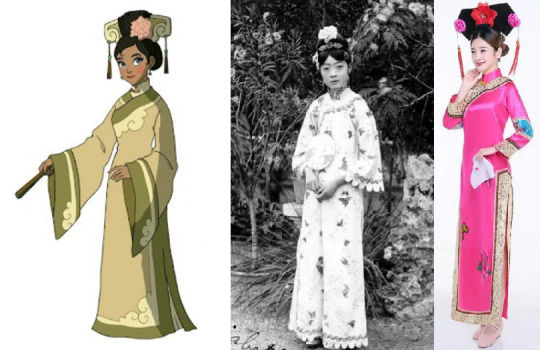
Katara's Ba Sing Se dress is inspired by changyi robes (氅衣), which were full-length gowns worn by Manchu noblewomen during the Qing Dynasty (1644–1911). Characteristics of changyi include high slits on both sides of the dress, prominent trim along the openings of the robe, and a rounded cross collar (pianjin/偏襟). Around the beginning of the 20th-century, standing collars and more fitted silhouettes also became common on changyi and other Manchu women's clothing. Overall, Katara's Ba Sing Se dress possesses many characteristics of a late Qing Dynasty changyi.
However, similar to her headdress, her robe isn't 100% historically accurate. The standing collar doesn't appear to be directly attached to the pianjin opening and her sleeves appear to be modeled more after hanfu than qizhuang (Qing Manchu clothing). Nonetheless, her design still alludes to a very specific period in Chinese fashion history, rather than simply being a generic "Asian-esque" dress. Plus, the design is just lovely!
Fun Fact: The cloud pattern on Katara's dress is known as xiangyun (祥雲) or "lucky clouds" in Mandarin. Clouds are considered auspicious imagery in Chinese culture due to the Mandarin word for cloud (yún / 雲) sounding similar to the Mandarin word for good fortune (yùn / 運).
Like what I’m doing? Tips always appreciated, never expected. ^_^
https://ko-fi.com/atlaculture
842 notes
·
View notes
Photo
INTERESTING



chinese hanfu by 花夕树国风原创工作室
225 notes
·
View notes
Note
I'm planning out a modern fantasy story where the man characters, who are vigilante-type people, all wear hanfu. Each group has a different dynasty as inspiration. I wanted to ask if Qing dynasty hanfu are considered hanfu in the same way that Tang or Song dynasty hanfu are.
You hit a bit of a landmine, haha 😂
The Qing Dynasty was ruled by the Manchu ethnic group. Laws were implemented forcefully converting fashion from the Hanfu styles of the previous Ming dynasty to Manchu wear for everyone, so Qing Dynasty clothing are not Hanfu. It's Manchu wear (满族服饰).
You'll notice Qing Dynasty clothing lacked the large sleeves and flowy dresses common in Hanfu, this is because the Manchus were nomads, so their clothing were more form fitting to make horseback riding easier. Women in the royal court wore what were called 'flower pot shoes' that had a raised platform in the centre.


Also the hair styles are different, especially noticeable in the case of men who had to shave the front half of their head and leave the back in a long braid. This caused a huge uproar among the Han people because in their belief system, hair is a gift from your parents and cannot be cut (unless you were going to be a monk). Cutting hair was a penalty equal to being beheaded. It actually caused a lot of conflict that resulted in the court threatening beheading for anyone who refused to conform.


Another dynasty that's in the same category is the Yuan Dynasty (Tang, Song, Yuan, Ming, Qing). The Yuan dynasty was governed by Mongolians (this was about when Ghengis Khan was having his fun all over the Asian continent) so the clothing from this dynasty are also not Hanfu.
All very beautiful though 😃❤️
#hanfu#汉服#中国#china#chinese hanfu#clothing#fashion#historical clothing#history#culture#Qing Dynasty#清朝#Yuan Dynasty#元朝#都很美#都喜欢
82 notes
·
View notes
Text
Medicine Seller Kimono
Lately I've been seeing posts asking about the Medicine Sellers' clothing: how they work, what they're wearing, and what the "basics" of a Medicine Seller's outfit are. This is my attempt to provide an explanation of the real world clothes the Medicine Sellers' outfits are based on as well as show what the two Medicine Sellers we've seen have in common.


source for the kimono sleeve image and the hanfu sleeve image


I didn't explain things for Kon if they were explained in Ri's diagram. By the way, I have a post analyzing Kon's obi musubi specifically, if anyone is interested in that.
And here's a very basic sample Medicine Seller I made using just the things Ri and Kon's designs have in common. This is just meant as a basic guide/idea for people who aren't sure where to start or what the structure of the Medicine Sellers' outfits seem to be (from the only two we've seen).

78 notes
·
View notes